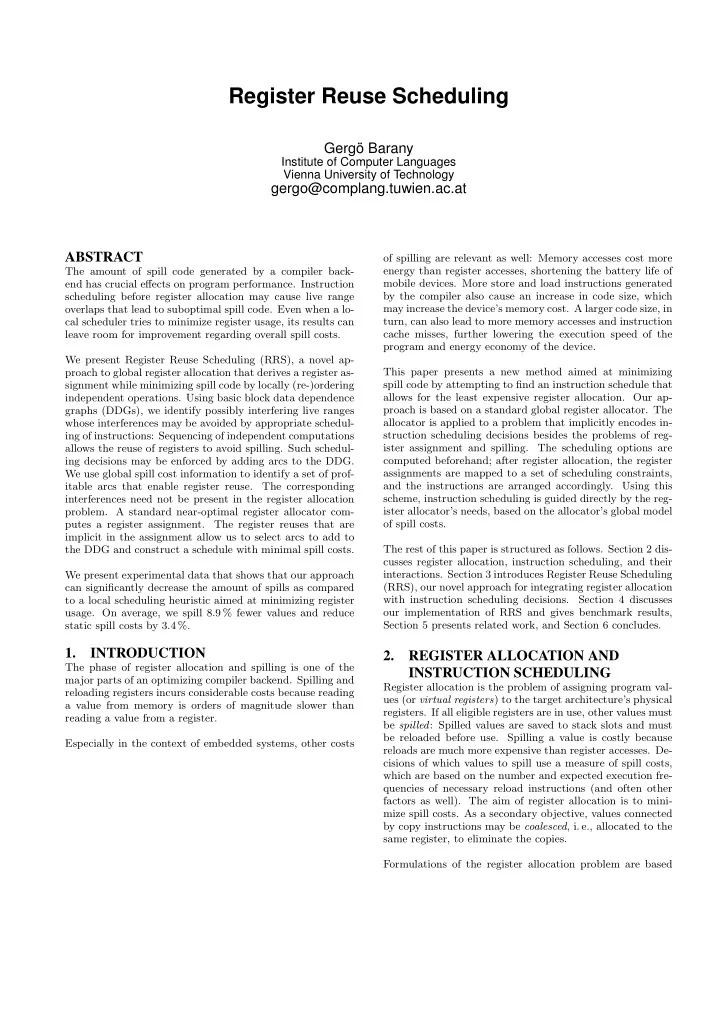

Register Reuse Scheduling Gergö Barany Institute of Computer Languages Vienna University of Technology gergo@complang.tuwien.ac.at ABSTRACT of spilling are relevant as well: Memory accesses cost more energy than register accesses, shortening the battery life of The amount of spill code generated by a compiler back- end has crucial effects on program performance. Instruction mobile devices. More store and load instructions generated by the compiler also cause an increase in code size, which scheduling before register allocation may cause live range overlaps that lead to suboptimal spill code. Even when a lo- may increase the device’s memory cost. A larger code size, in turn, can also lead to more memory accesses and instruction cal scheduler tries to minimize register usage, its results can leave room for improvement regarding overall spill costs. cache misses, further lowering the execution speed of the program and energy economy of the device. We present Register Reuse Scheduling (RRS), a novel ap- This paper presents a new method aimed at minimizing proach to global register allocation that derives a register as- signment while minimizing spill code by locally (re-)ordering spill code by attempting to find an instruction schedule that allows for the least expensive register allocation. Our ap- independent operations. Using basic block data dependence proach is based on a standard global register allocator. The graphs (DDGs), we identify possibly interfering live ranges whose interferences may be avoided by appropriate schedul- allocator is applied to a problem that implicitly encodes in- struction scheduling decisions besides the problems of reg- ing of instructions: Sequencing of independent computations allows the reuse of registers to avoid spilling. Such schedul- ister assignment and spilling. The scheduling options are computed beforehand; after register allocation, the register ing decisions may be enforced by adding arcs to the DDG. We use global spill cost information to identify a set of prof- assignments are mapped to a set of scheduling constraints, and the instructions are arranged accordingly. Using this itable arcs that enable register reuse. The corresponding interferences need not be present in the register allocation scheme, instruction scheduling is guided directly by the reg- ister allocator’s needs, based on the allocator’s global model problem. A standard near-optimal register allocator com- putes a register assignment. The register reuses that are of spill costs. implicit in the assignment allow us to select arcs to add to the DDG and construct a schedule with minimal spill costs. The rest of this paper is structured as follows. Section 2 dis- cusses register allocation, instruction scheduling, and their interactions. Section 3 introduces Register Reuse Scheduling We present experimental data that shows that our approach can significantly decrease the amount of spills as compared (RRS), our novel approach for integrating register allocation with instruction scheduling decisions. Section 4 discusses to a local scheduling heuristic aimed at minimizing register usage. On average, we spill 8.9 % fewer values and reduce our implementation of RRS and gives benchmark results, Section 5 presents related work, and Section 6 concludes. static spill costs by 3.4 %. 1. INTRODUCTION 2. REGISTER ALLOCATION AND The phase of register allocation and spilling is one of the INSTRUCTION SCHEDULING major parts of an optimizing compiler backend. Spilling and Register allocation is the problem of assigning program val- reloading registers incurs considerable costs because reading ues (or virtual registers ) to the target architecture’s physical a value from memory is orders of magnitude slower than registers. If all eligible registers are in use, other values must reading a value from a register. be spilled : Spilled values are saved to stack slots and must be reloaded before use. Spilling a value is costly because Especially in the context of embedded systems, other costs reloads are much more expensive than register accesses. De- cisions of which values to spill use a measure of spill costs, which are based on the number and expected execution fre- quencies of necessary reload instructions (and often other factors as well). The aim of register allocation is to mini- mize spill costs. As a secondary objective, values connected by copy instructions may be coalesced , i. e., allocated to the same register, to eliminate the copies. Formulations of the register allocation problem are based
Recommend
More recommend